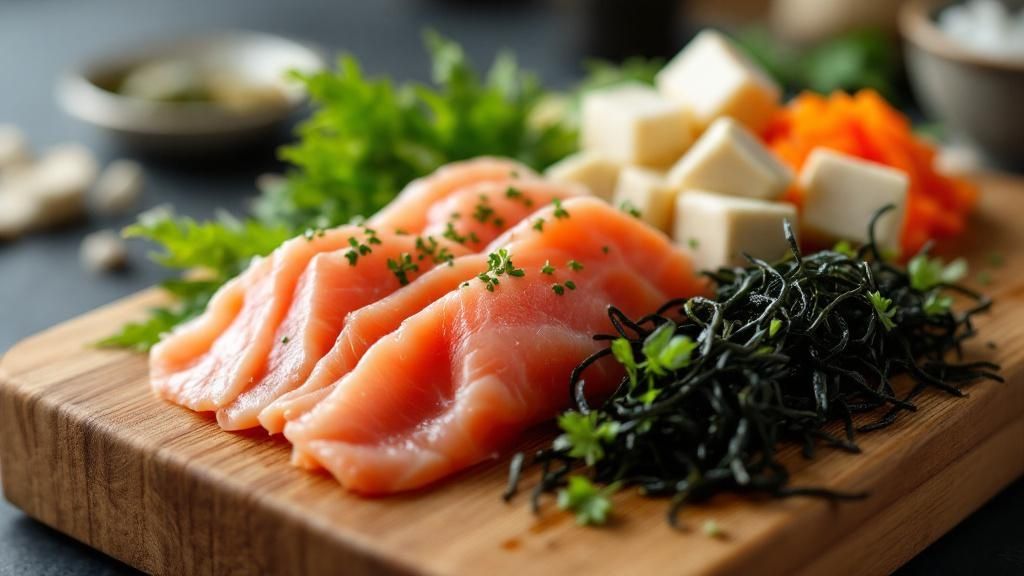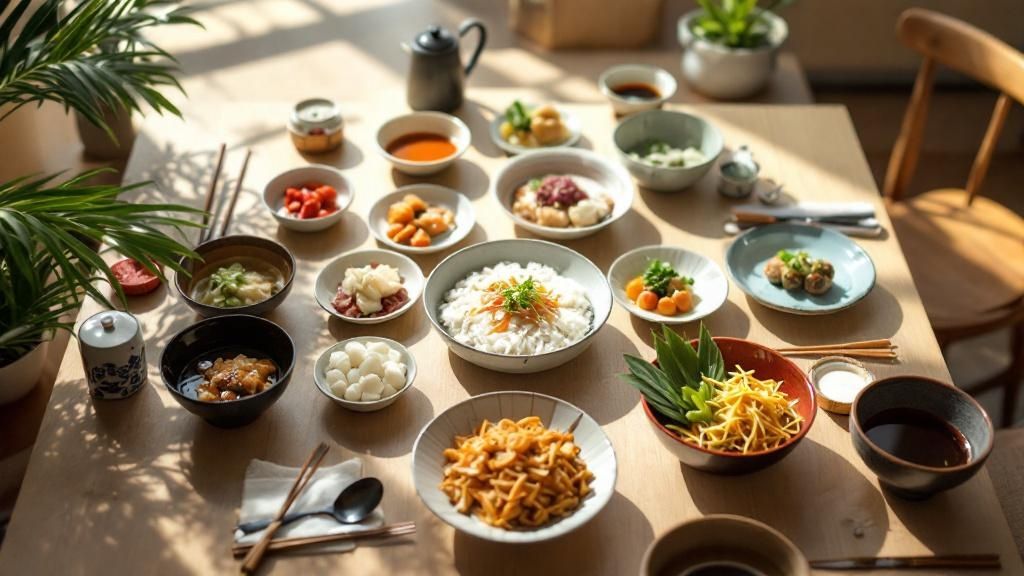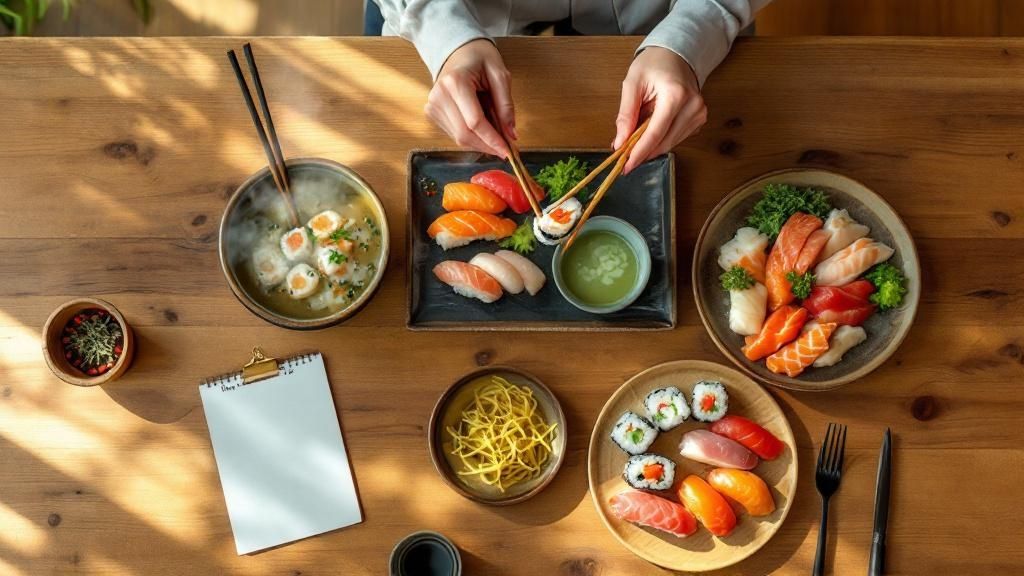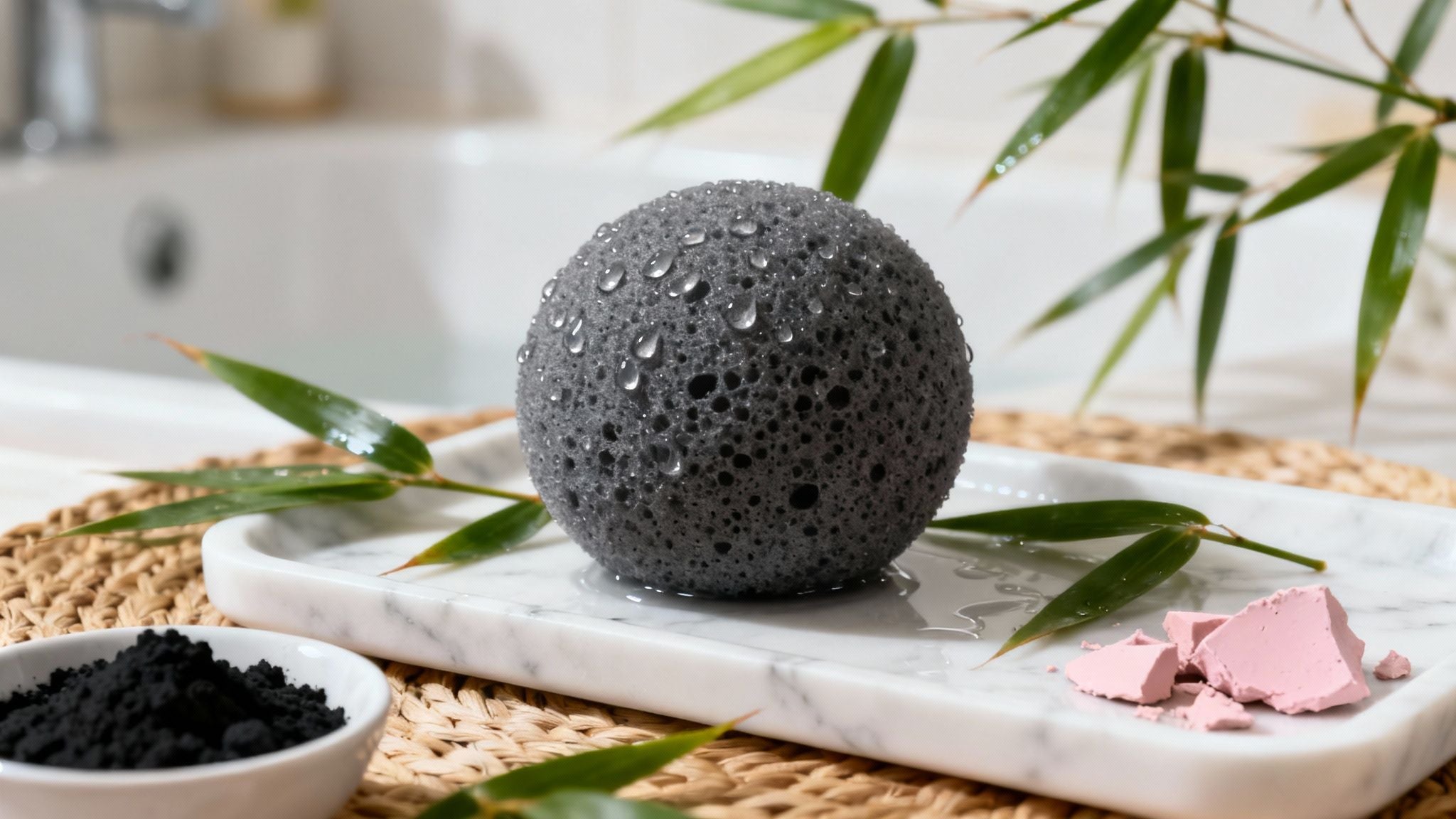Why Everyone's Fascinated by Japanese Food and Longevity

Spend five minutes in the health food aisle, and you'll likely bump into a stack of books about Japanese eating habits. It's everywhere! What's really caught my attention, though, after years of digging into dietary patterns, is the hard data behind the hype. The connection between Japanese food and a long, healthy life is pretty convincing. We're not just talking about adding years, but how those years are spent – with seemingly better protection against diseases we see so much of in the West.
This isn't just some casual observation either. The traditional Japanese diet is famous for its health perks, especially when it comes to longevity and lower rates of age-related illness. Look at Okinawa, for example. This island in southern Japan has one of the highest concentrations of centenarians on the planet, and their traditional diet is thought to play a significant role. Think low calories, low saturated fat, but packed with goodness like phytoestrogens from soy and phytonutrients from vegetables. Learn more about why it's so healthy here. It's a stark contrast to the typical Western diet, often loaded with processed foods, red meat, and added sugar.
Thinking about making some healthy changes? Something as simple as cutting back on sugar can make a real difference. Check out the benefits of quitting sugar. It's all part of this growing movement toward whole, unprocessed foods. In the next section, we'll get into the specifics of Japanese cuisine – those nutritional all-stars – and unpack why they're so good for you.
The Hidden Nutritional Powerhouses in Japanese Cuisine

Ever wonder why a simple bowl of miso soup can be so incredibly satisfying? It's more than just comfort; it's the nutritional depth that often gets overlooked. Take seaweed, for example. It's not just a pretty garnish; it’s packed with essential minerals like iodine, crucial for thyroid health, that are hard to find in land-based veggies. Many Western diets are seriously missing out on these key nutrients.
This nutritional richness extends to fermented favorites like miso and natto. Fermentation basically supercharges ordinary soybeans, transforming them into digestive powerhouses teeming with good bacteria and enzymes that help you absorb nutrients more efficiently. If you’re curious to explore further, check out some info on Japanese fermented vegetables. And let's not forget the omega-3 rich fish, a cornerstone of Japanese cuisine, providing those brain-boosting compounds vital for sharp cognitive function.
Exploring Key Nutrients
Then we have green tea. It's more than just a caffeine pick-me-up. Green tea delivers a potent dose of antioxidants that fight cellular damage. Speaking of which, the Japanese diet is rich in these protective compounds. Think soybeans, seaweed, and that green tea again – all bursting with antioxidants. This helps protect against cellular damage and chronic diseases, while the omega-3s from fish and seaweed support brain, eye, and heart health. Want to delve deeper into these amazing benefits? Here’s some more info. The Japanese diet is often associated with longevity, and for those interested in exploring further, there are resources on supplements for longevity as well.
To really illustrate the nutritional power of traditional Japanese foods, let's take a look at this table:
Key Nutrients in Traditional Japanese Foods
A comprehensive breakdown of essential nutrients found in common Japanese ingredients and their specific health benefits
| Food Item | Primary Nutrients | Health Benefits | Daily Serving |
|---|---|---|---|
| Seaweed (Nori, Wakame, Kombu) | Iodine, Iron, Calcium, Vitamins A & C | Thyroid health, bone strength, immunity | 1-2 sheets Nori, 1/4 cup Wakame/Kombu |
| Miso | Probiotics, Vitamin K, Protein | Digestive health, bone health, immune support | 1-2 tablespoons |
| Natto | Probiotics, Vitamin K2, Nattokinase | Bone health, cardiovascular health, gut health | 50 grams |
| Fish (Salmon, Mackerel, Tuna) | Omega-3 fatty acids, Vitamin D, Protein | Brain health, heart health, immune function | 100-150 grams |
| Green Tea | Antioxidants, L-theanine | Cellular protection, stress reduction, heart health | 2-3 cups |
| Soybeans (Edamame, Tofu) | Protein, Fiber, Isoflavones | Heart health, bone health, hormone balance | 1/2 cup Edamame, 100 grams Tofu |
This table highlights just a few of the many nutritious staples in Japanese cuisine. Notice the variety of benefits and how easily these foods can be incorporated into a daily diet.
The Power of Synergy
What’s truly fascinating about Japanese cuisine is how these ingredients work together. The traditional approach to food pairings creates synergistic effects, boosting the individual benefits of each nutrient. This holistic philosophy results in a diet that truly nourishes from the inside out.
What Research Actually Reveals About Japanese vs Western Eating

So, you're curious about Japanese food and its health halo? It's definitely more complicated than a simple yes or no. It isn't just about smaller portions or the fact that people in Japan tend to be more active. Emerging research suggests that the actual ingredients and traditional Japanese cooking methods themselves might offer some serious metabolic advantages that scientists are still working to fully understand.
For example, studies comparing traditional Japanese diets with typical Western diets show fascinating differences in how our bodies process nutrients. These studies range from observing large populations over long periods to tightly controlled lab experiments. They're starting to reveal why Japanese eating patterns seem to offer protection against things like obesity, diabetes, and heart disease, and it goes way beyond simply counting calories. Even looking back at historical dietary patterns, the quality of the ingredients seems to play a major role. You can dig deeper into some of this research here. In one interesting study, rats fed a Japanese diet had better carbohydrate and lipid metabolism, less strain on their organs, and lower oxidative stress compared to rats fed a typical American diet.
The Impact of Westernization
Here's another piece of the puzzle: as Western food becomes more common in Japan, we're seeing some worrying health trends emerge. It's like a real-time experiment playing out, and it really underscores how important traditional food wisdom is for our well-being today. If you're interested in learning more about this, check out our guide on the Japanese diet for weight loss. Even though Japanese cuisine is generally healthy, incorporating healthy fats can further enhance its nutritional value. For instance, consider the olive oil nutrition facts. Understanding how diets are changing helps us see the intricate link between what we eat and how it impacts our health.
Real Health Benefits You Can Actually Expect

Let's be honest about what incorporating more Japanese-style eating can do for your well-being. It's not a miracle cure, but there are tangible perks people often experience. Personally, I noticed improved digestion almost right away, and my energy levels felt way more consistent. This makes total sense given the emphasis on whole foods and the beautifully balanced nature of Japanese cuisine.
Over time, you might see positive changes in your heart health, like lower cholesterol and blood pressure. The research suggests a link between Japanese food and improved heart health, especially when compared to a Western diet often packed with processed foods and saturated fats. The abundance of fish, vegetables, and fermented foods like miso and natto likely plays a significant role.
What You Might Notice Over Time
Many people also find that weight management becomes easier. It's not about restrictive dieting, but a natural shift towards a healthier relationship with food. Smaller portions, mindful eating, and nutrient-dense ingredients often lead to sustainable weight management.
For those curious about matcha, check out this article about its wellness benefits: Unlock the Benefits of Drinking Matcha for Wellness. It fits perfectly into the larger conversation about Japanese food and long-term health.
To help illustrate the timeline of these benefits, take a look at this table:
Health Benefits Timeline of Japanese Diet Adoption Expected health improvements and their typical timeframes when transitioning to Japanese eating patterns
| Time Period | Physical Changes | Metabolic Improvements | Long-term Benefits |
|---|---|---|---|
| First Week | Improved digestion, increased energy levels | ||
| First Month | Reduced bloating, improved regularity | May start to see small changes in blood pressure and cholesterol | |
| 3-6 Months | Sustainable weight management | Noticeable improvement in blood pressure and cholesterol | Reduced risk of chronic diseases |
| 1 Year+ | Improved heart health, stronger immune system |
As you can see, the benefits accumulate over time. It's about making gradual, sustainable changes to your diet and reaping the rewards over the long haul.
Addressing Concerns
Now, it's important to be realistic and acknowledge potential concerns. Mercury levels in certain fish and sodium content in some traditional dishes are valid points. This is where mindful choices and moderation are key. Choose lower-mercury fish options and be mindful of sodium intake.
Ultimately, the benefits you personally experience will depend on your individual circumstances, including genetics, lifestyle, and overall health. Not everyone will see the same results, and it's crucial to work with your doctor, especially if you have pre-existing health conditions. While the anti-inflammatory perks of green tea and fermented foods are fantastic, they aren't a replacement for medical advice. Think of Japanese eating patterns as a supportive element in a holistic approach to well-being.
Making Japanese Eating Work in Your Actual Life
You don't need to relocate to Tokyo or master the art of sushi rolling to reap the rewards of Japanese cuisine. This is about finding realistic ways to incorporate Japanese eating principles into your everyday life, all while respecting your current food preferences and routines.
One frequent question I get is about specific ingredients. Some Japanese staples, like high-quality seaweed and miso, are truly worth seeking out. Their nutritional value is tough to beat. But others can be easily swapped for readily available alternatives. Don't fret if you can't find a rare mushroom variety – ordinary button mushrooms offer similar health perks. The key is adapting, not perfectly mimicking.
Adapting to Your Kitchen
Another common concern? Specialized cooking equipment. Let's be honest, most of us don't have a full suite of Japanese kitchen tools. And that's perfectly fine! A standard steamer works just as well as a bamboo one. Simple stir-fries and quick pickles embody the spirit of Japanese cooking without needing any special skills. Looking for some quick and easy inspiration? Check out these Easy Japanese Recipes.
Meal Planning Strategies
Consider your approach to meal planning, too. Japanese meals typically consist of smaller portions of multiple dishes. This variety is crucial for balanced nutrition. But don't feel obligated to create elaborate, multi-course affairs. A simple protein source, a vegetable dish, and a small bowl of rice capture the essence beautifully.
Navigating Restaurants and Family Preferences
Dining out? Japanese restaurants are full of healthy options. My go-to's are grilled fish, steamed vegetables, and a warming bowl of miso soup. I tend to skip the tempura and anything with creamy sauces. Even at home, you can seamlessly blend Japanese elements with family favorites. Try adding a seaweed salad to your usual dinner, or using a Japanese-inspired marinade for your chicken.
Overcoming Obstacles
Finally, let's talk about the practical stuff: budget and ingredient availability. Frozen edamame is just as nutritious as fresh, and often much easier on the wallet. Check out your local Asian markets – they often have key ingredients at lower prices than larger supermarkets. The goal is to be resourceful and find what works for you without sacrificing the fundamental health benefits of this wonderful cuisine.
Building Lasting Healthy Eating Habits From Japanese Wisdom
The real magic of Japanese cuisine isn't about some miracle superfood; it's about a whole new perspective on food. Think of it as a guiding philosophy, not a strict diet. Whether you're aiming for a total health makeover or just small daily improvements, Japanese eating wisdom has a lot to offer.
Start small. Don't try to change everything at once. Maybe swap white rice for brown rice once a week. Or add a side of steamed greens to dinner. These little changes build momentum and make the transition easier. You might be surprised to find yourself craving simpler, healthier meals.
Personalizing Your Approach
Is Japanese food healthy for you? Well, that depends on your individual goals. If you're aiming for better heart health, focus on more fish and seaweed. Digestion issues? Fermented foods like miso and natto could be game-changers. Try things out and see what works best for you. You might be surprised by the small changes you feel in your energy and overall wellness. For some delicious matcha recipes that can also support weight loss, check out this article: 7 Delicious Matcha Recipes for Weight Loss.
Maintaining Long-Term Habits
How do you make these changes stick? Find a friend to keep you accountable, track your progress, or reward yourself for milestones. It's not just about the number on the scale. Notice how your clothes fit, how you sleep, and your overall mood. These are all important signs of progress.
Troubleshooting Challenges
You'll hit bumps in the road. Maybe you're craving your old comfort foods, or you're having trouble finding certain ingredients. Don't give up! This is totally normal. Find healthy substitutes, try new recipes, and remember your "why." Why did you start this in the first place? Reconnect with your motivation and keep going.
The beauty of Japanese eating wisdom is its flexibility. It's not about strict rules, but about finding what works for you. Embrace the process, enjoy the delicious food, and notice the benefits over time.
Ready to dive into authentic Japanese flavors and start your own culinary adventure? Check out a wide range of Japanese products at Buy Me Japan today! From premium beauty products to delicious snacks and drinks, there's something for everyone.




Share:
Top 10 Best Japanese Tea Brands for 2025
Japanese Diet for Weight Loss: Real Secrets From Japan